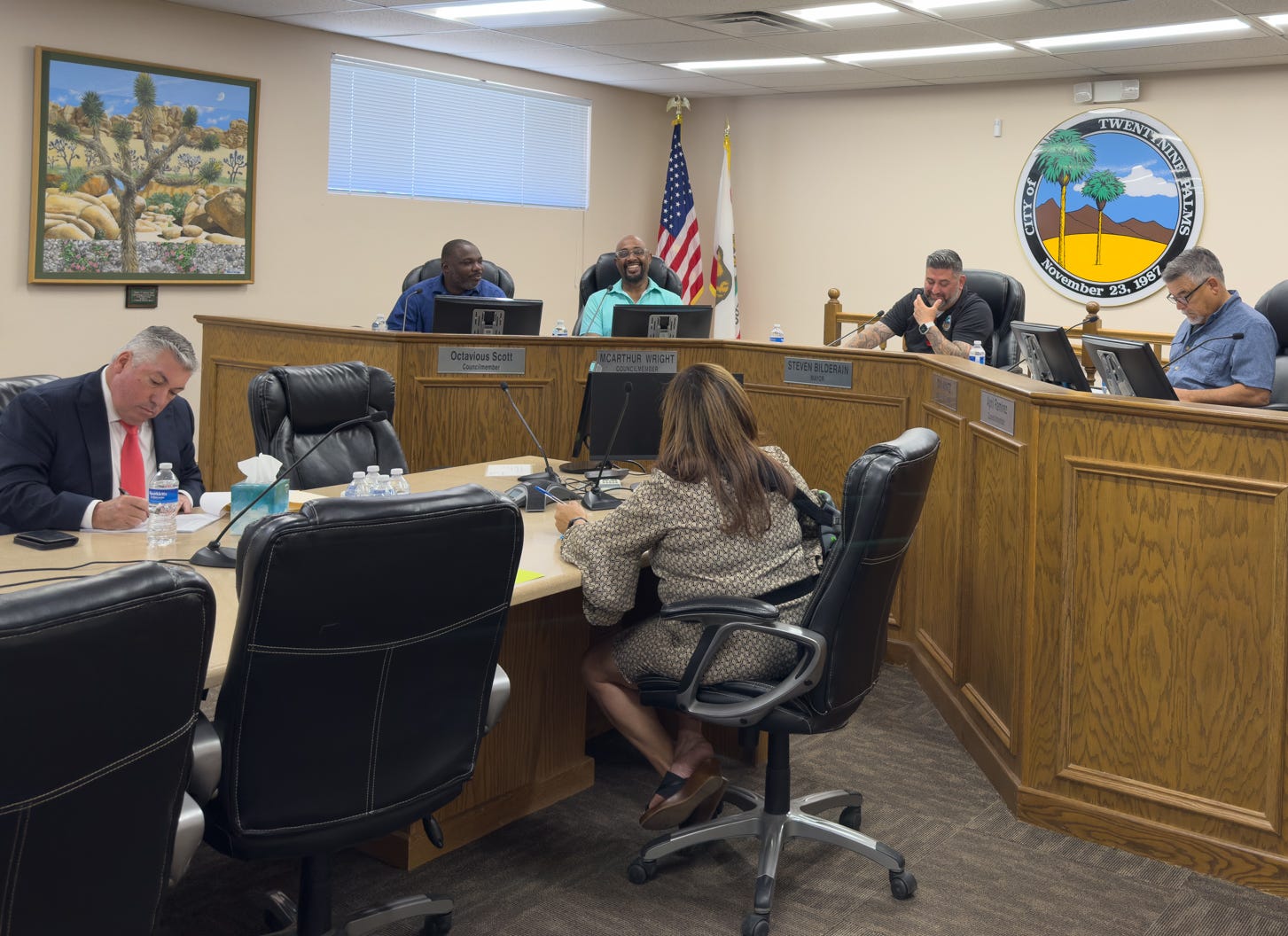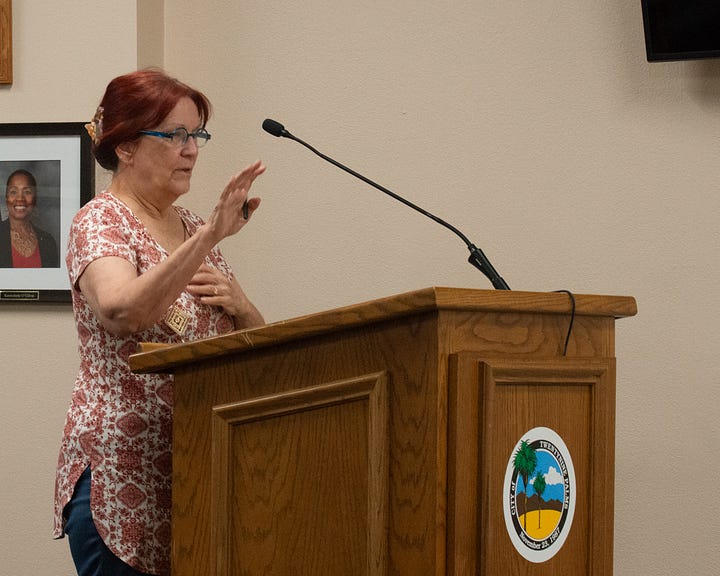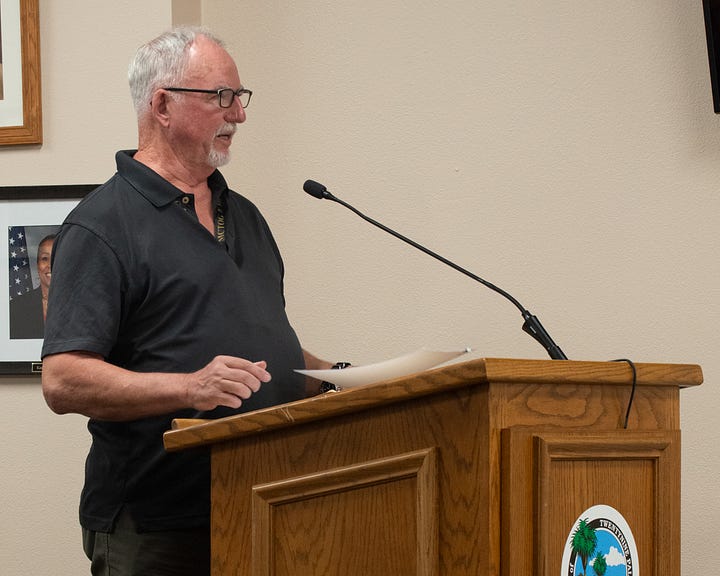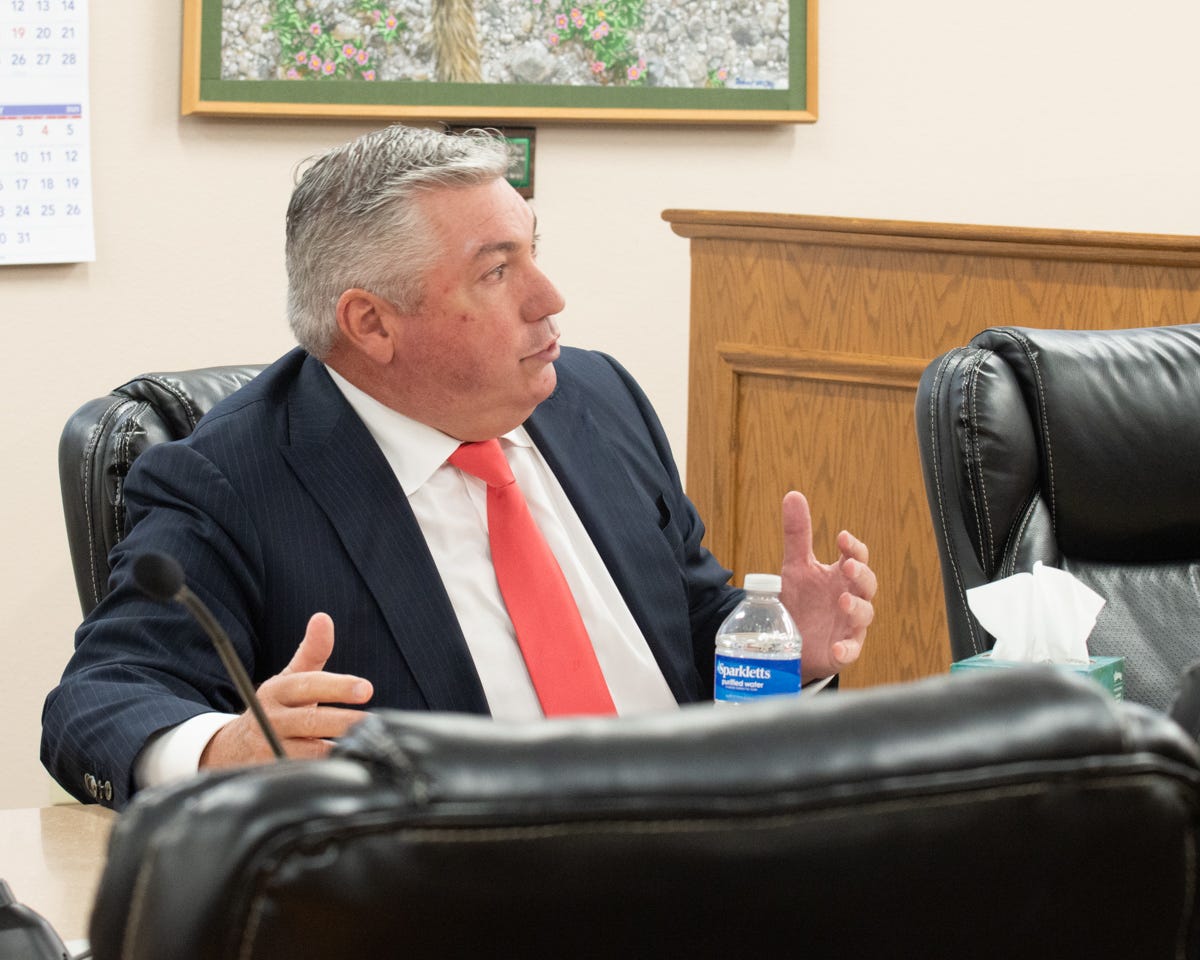RECAP: City Council Closed Session, May 19, 2025
The City Attorney jumps into public comment and a deeper dive into closed sessions on litigation

On Monday, May 19, City Council conducted a 10 am closed session to discuss one case of Anticipated Litigation, Significant Exposure to Litigation and to continue its review of the City Manager. That review is currently slated to conclude at the meeting on Tuesday, May 27 with potential ratification of the City Manager’s contract.
The brief agenda for the the May 19 meeting can be reviewed here.
Public Comment
Usually Desert Trumpet doesn’t attend closed session meetings, but this one specified a public comment session. Given much of the large evacuation area surrounding the the residence of Palm Springs fertility clinic bomber Guy Edward Bartkus was still in effect, we wondered if evacuees might be at the meeting. They weren’t, but other events did make it worth our time as City Attorney Patrick Muñoz clarified an issue that had been on our minds for a few years.


Two residents spoke in public comment or attempted to. Rita Lilly gave a glowing review of City Manager Stone James while Planning Commissioner Jim Krushat had hoped to address recent Council and Planning Commission discussions of campgrounds and RV parks in rural living zoning:
I wanted the opportunity to talk to the Council to give you some perspective—this is my perspective from the Planning Commission on this—commercial campgrounds and RV parks in residential areas, or, excuse me, in rural areas, which is kind of a misnomer. We call it rural living, and it's really rural areas that we're discussing, because rural living is only one of the allowed uses of that plan. If you actually look over the the entire chapter 19.08…
At that point City Attorney Muñoz interrupted:
I'm sorry to interrupt this afternoon [sic]. Sorry, Jim. Since Mr. Krushat is on Planning Commission, and since we're talking about an issue that's within the Planning Commission's jurisdiction and something that might be coming before the Council, there's been some recent developments in the law that under the Brown Act, it's not appropriate for him to address the Council on this unless it's an agendized issue.
Krushat continued, adding the he just wanted to remind Council about rereading a regulation, and Muñoz again clarified that he was unable to speak on an item unless it was on the agenda, which would notify other Planning Commissioner that the topic is before the Council should they also want to speak. The discussion concluded with a further clarification:
Krushat: What if I was a citizen that lives in a rural area? Well, because…
Muñoz: You're on the Planning Commission, you don't get that benefit of being able to switch hats. (Laughter)
Closed session: Anticipated Litigation, Significant Exposure to Litigation
Desert Trumpet has noticed an apparent increase in litigation items on closed session agendas. And in fact, there is an increase. There were four closed sessions to discuss four litigation issues in 2023, four sessions for five cases in 2024 and, just five months into 2025, there’ve been three sessions to discuss a whopping seven litigation cases, five of those being on the April 22 Council meeting agenda.
Since January 1, 2023, closed sessions have included the following litigation items and numbers of cases:
Anticipated Litigation: 2
Anticipated Litigation / Initiation of Litigation: 4
Anticipated Litigation / Significant exposure to litigation: 7
Existing Litigation: 2
Potential Litigation: 1
The April 22, 2025 session includes four cases of Anticipated Litigation / Significant exposure to litigation, while most items were for a single case.
“Secrecy itself breeds distrust”1
The May 19 closed session minutes are not yet available, but Desert Trumpet has reviewed the minutes for the 15 other closed session litigation items. Of those, most contain “nothing to report,” or similar language, while some reflect no announcement at all, reading “no closed session announcement.”
This is the sole report out of the 15 items, made for the closed session held on March 28, 2023:
Mayor Wright announced that the City Council authorized the City Manager to join a nationwide litigation regarding the opioid crisis against five new defendants and authorized settlement funds to be dispersed to San Bernardino County for countywide abatement. Councilmember Klink made a motion to approve, Councilmember Mintz seconded, and the vote was 5-0 in favor.
So what is Council doing in all those other sessions? In some cases, per the Brown Act, documents should be attached to the closed session agenda, in others, circumstances should be described in the agenda or announced prior to the closed session that would give some clue as to the content.
Indeed, Cal Cities and the First Amendment Coalition both criticize agenda listings of litigation exposure as being overused and a method to avoid public scrutiny.2
The frequency with which litigation appears on the City docket without attachments and / or an announcement of action in the minutes strains credibility. Are Council and the City Attorney using “anticipated litigation” to keep uncomfortable topics out of the public eye?
Desert Trumpet will be making public information requests for releasable documents related to these closed sessions and will report back once they are received.
Desert Trumpet Administrative Associate Heidi Heard and ChatGPT assisted in researching this article.
Leave your thoughts in the comments below. Please note that we do not allow anonymous comments. Please be sure your first and last name is on your profile prior to commenting. Anonymous comments will be deleted.
Feel free to share this article!
Are you subscribed?
League of California Cities, Open & Public IV: A Guide to the Ralph M. Brown Act (2010), Chapter 5 “Closed Sessions.” p. 35-36
League of California Cities, Open & Public IV: A Guide to the Ralph M. Brown Act (2010), Chapter 5 “Closed Sessions.”
Practice‐tip text on p. 35–36 notes that “secrecy itself breeds distrust” and counsels legislative bodies “to resist the tendency to call a closed session simply because it may be permitted.”
The same chapter stresses that the litigation exception “is narrowly construed and does not permit activities beyond a legislative body’s conferring with its own legal counsel,” giving examples (no settlement bargaining, no mediation, no general contract or policy discussions).
First Amendment Coalition, California Brown Act Primer (last rev. Mar. 2022), § “Meetings to discuss ‘pending litigation.’”
Explains that a closed session based on “significant exposure to litigation” is allowed only when “existing facts and circumstances” create a real legal threat, and even then the body may not take action on a related policy decision that by law requires a public hearing.
The primer flags this exception as one that has been “carefully crafted due to frequent past disputes,” reflecting the criticism that agencies sometimes invoke it too freely.



I remember another one. The mobile home park off of Adobe, which involved litigation. I'll spare you my recollection and provide the news report instead.
https://www.hidesertstar.com/.../article_734b6c16-f781...
Not surprising at all, truly shocked there has not been more quite honestly. This City is severely lacking when it comes to transparency.